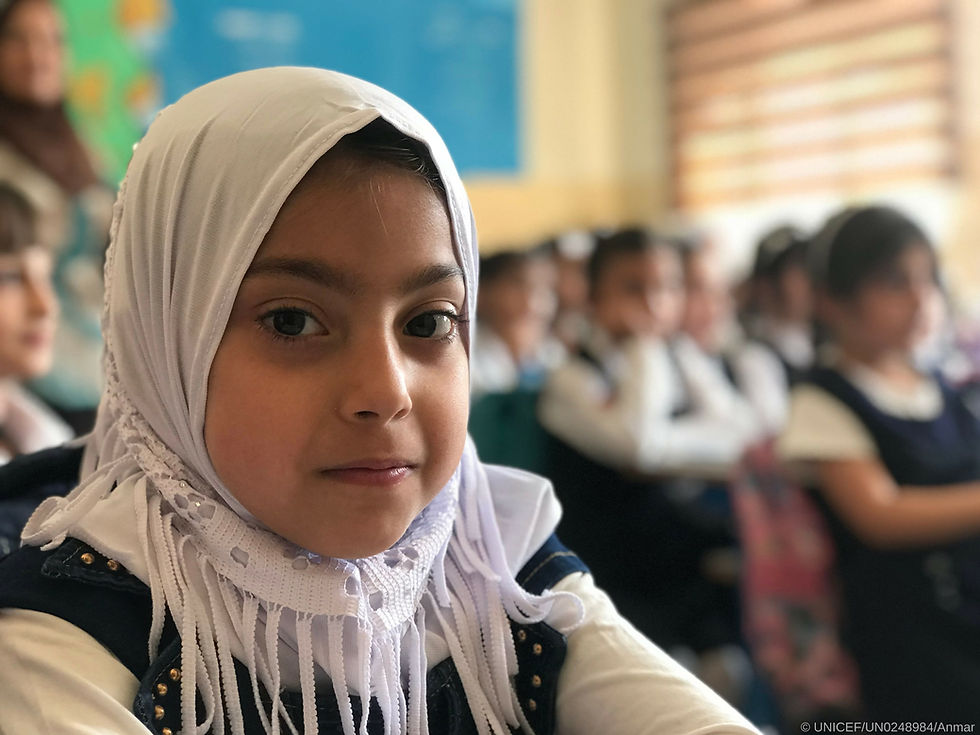IRAQ: CHILD MARRIAGE OR CULTURAL TRADITION?
- Michael Thervil

- Nov 12, 2024
- 3 min read
Written by Michael Thervil

Photo by UNICEF
It was reported that the Shia Muslim Parliament in Iraq is getting closer to amend their laws to allow females under the age of 18 to get married. For some women in Iraq, this is seen as a good thing as it allows them to retain and pass down their traditional family values, norms, and religious beliefs to younger females thus conditioning them to accept and carry on the social rules and expectations of Iraqi culture. However, they are significantly overshadowed by not just other women in Iraq but across the world that hold the position that 9 years of age is too low for a female in their culture to get married. For the people that fall into the category of the latter, they feel as if women’s rights are either under attack or are going to be completely dismantled in their entirety.
They also expressed their concerned of the possibility of the increased risk of physical and sexual abuse of females that may occur between them and their significantly older would-be husbands. Fearing the rollback of the Iraqi law known as the “Law of 188” which was a law that was created in 1959 after the fall of the Iraqi monarchy back then. Fast forward to recent times, it was reported by UNICEF (United Nations Children Agency) that roughly 28% of females in Iraq got married before the age of 18. Although the Law of 188 was ratified in 1959, in 2024, females in Iraqi still manage to get married before the age of 18. This begs the question: “How did these females manage to get married before the age of 18 if the Law of 188 was put in place before they were born? The answer is simple – there is a division of church and state in Iraq just as there is a division of church and state in America.
On one hand, the Iraqi Parliament passed a law that states a female can’t be wed before the age of 18, but at the same time the state must observe the religious freedoms of its citizens. Some people would call the recognized division of church and state as a legal loophole. Then there are others who wish to see their religious views respected as they see the religious value in allowing a female to be married at the age of nine. The reason for this is because through the religious lens, allowing a female to get married early serves as a stop gap measure to prevent and protect females from engaging in “immoral relationships” under Islamic Law. In short, Iraqi culture doesn’t not want to see its women engage down the path of “whoredom” chosen by nearly all women in the Collective West.
For people who either favor and/or live within the Collective West, the idea of females getting married at the age of 9 is unfathomable. For them, the notion of choice and maturity come into play. However, for Iraqis that support the lowering of the age of marriage in Iraq, it is seen as proper for a more mature man to be wed to a much younger bride as he is in the position to demonstrate and uphold moral superiority, direction, provision, protection, and financial resources.
Could it be that the older Iraqi females feel threatened by the high level of value and/or competition that younger females bring to the market in Iraq and elsewhere in the world? Or could it be that the women who oppose the lowering of the legal age to marry feel as if younger women pose a significant threat to their livelihoods because men are more apt to give their resources to a younger female than an older one? Or is this about controlling the allocation of men’s resources in Iraq and elsewhere around the world? These are questions that females who oppose the lowering of the legal age to marry must answer.
It’s simply not enough for them to claim that men will engage in physical and sexual abuse. Why, because men are not physically intimidated by women in the general sense, nor are men going to sexually abuse their wives when they can easily pay a prostitute that will be happy to fulfill all of their sexual desires. This is something to think about and we would love to hear your thoughts on this matter in the comments below.












Comments